Nimboda :- A success story of community effort
This is a story of a Gram Panchayat in the village Nimboda in the block of Sarada of Udaipur district in Rajasthan. This is a tribal dominated Gram Panchayat where the community is rich in their values but due to difficult geographical access and lack of awareness, majority of population was not aware about importance of education and issues related to protection of child rights. In the CTS (year 2010) of State Government it was found that more than eighty children from this Panchayat were out of school and among them many were engaged in labour work. To resolve this issue, community opinion makers were being consulted repeatedly and accordingly solutions were being facilitated by GSS. Target families were not only linked with various social security schemes but they were also benefitted with livelihood enhancement interventions of GSS. To ensure easy access to education and protective environment for every child, PRI and SMC members were trained at certain intervals followed by regular follow ups of the same. Due to these activities, a positive environment developed in the area and some people came forward (including women and children) to work for child protection. With the help of such people VCPC's (Village Child Protection Committee) were formed.
As a result of the above efforts, the target of hundred percent enrolments in the school had been achieved in the beginning of academic year 2012 (July). Due to Child Tracking System developed by VCPC, this Gram Panchayat has been declared as Child Labour Free and Child Friendly Panchayat in September 2012. For the first time in this tribal area International Girl Child Day was celebrated on March 8, 2012 which was hosted by Nimboda Gram Panchayat. In this grand celebration Mr. Raghuveer Meena, MP, Udaipur and various district officials were present to encourage the community and children. This Panchayat is a shining example of bringing positive changes in the society through collective community efforts. Recently Mr. Joechim Theis, Country Chief, Child Protection UNICEF with his team visited Nimboda and interacting with the committee members, appreciated the efforts made by GSS.
A beginning ...
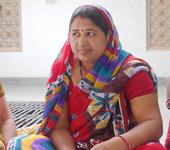 Manju Devi Salvi from the village Jalo Ki Madar of Rajsamand district and member of Saraswati SHG, would have never thought that her life was about to change in a couple of months. When GSS organized first orientation programm for the SHGs in Khamnor Block, it was noticed that some SHG members were interested in tailoring work, Manju Devi was one of them. After undergoing formal training conducted by GSS on tailoring skills, she focused on preparation of children's wear as per the local demand. She also started stitching cloth bags because of its increasing demand in urban areas. GSS helped her for better market linkages as a result now she is earning RS 3500/- per month. This regular and substantial earning gives her enough confidence to participate in different village level developmental activities as well.
Manju Devi Salvi from the village Jalo Ki Madar of Rajsamand district and member of Saraswati SHG, would have never thought that her life was about to change in a couple of months. When GSS organized first orientation programm for the SHGs in Khamnor Block, it was noticed that some SHG members were interested in tailoring work, Manju Devi was one of them. After undergoing formal training conducted by GSS on tailoring skills, she focused on preparation of children's wear as per the local demand. She also started stitching cloth bags because of its increasing demand in urban areas. GSS helped her for better market linkages as a result now she is earning RS 3500/- per month. This regular and substantial earning gives her enough confidence to participate in different village level developmental activities as well.
Gram Jan Jagran Abhiyaan...
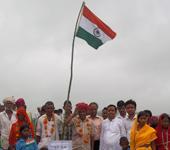 This may sound weird but is true that even after 70 years of independence we still have many villages where people have never witnessed the celebration of Independence Day or Republic Day. There are a number of revenue village in remote tribal area where these days of national importance have never been celebrated. Since more than a decade GSS has been identifying such places every year and celebrates these days with the communities. This initiative is a part of our Gram Jan Jagran Campaign under which we not only celebrate these days but also raise the community’s voice for getting basic amenities. Last year we celebrated our Independence Day in village Juna Kua of block Sarada and Republic Day in villages Udiyakhera of block Girwa. In both of these villages flag hoisting was done for the first time after Independence.
This may sound weird but is true that even after 70 years of independence we still have many villages where people have never witnessed the celebration of Independence Day or Republic Day. There are a number of revenue village in remote tribal area where these days of national importance have never been celebrated. Since more than a decade GSS has been identifying such places every year and celebrates these days with the communities. This initiative is a part of our Gram Jan Jagran Campaign under which we not only celebrate these days but also raise the community’s voice for getting basic amenities. Last year we celebrated our Independence Day in village Juna Kua of block Sarada and Republic Day in villages Udiyakhera of block Girwa. In both of these villages flag hoisting was done for the first time after Independence.
These villages are completely devoid of basic infrastructures like schools, health centers, roads etc. A Gram Sabha was organized by GSS in both of these villages after celebration in which a detailed discussion was carried out with the local community to determine future course of action.
Padarada... A Village making a Difference
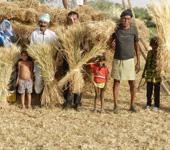 Our agriculture based initiatives have made a very positive impact on agricultural productivity and hence on the livelihood of the community in this tribal area. Village Padarada of Block Sarada with 92% tribal population is one of the examples showing this positive transformation. When GSS selected this village for its intervention, majority of population was dependent on labour work for their livelihood; agriculture was not on their priority. Most of the farmers were using ration's grain or farm saved seed as input due to which the yield was very poor. Under our well designed initiative Foundation/ Certified seed of Gram, Wheat and Moong were provided to the farmers for 0.4 ha area. Proper training and exposure regarding seed production and its storage were also given to the farmers, as a result average productivity of the selected crops more than doubled. Today this village in itself has become a model village for other villages in this tribal area. Farmers in this village proudly share their agricultural practices with visitors of the villages.
Our agriculture based initiatives have made a very positive impact on agricultural productivity and hence on the livelihood of the community in this tribal area. Village Padarada of Block Sarada with 92% tribal population is one of the examples showing this positive transformation. When GSS selected this village for its intervention, majority of population was dependent on labour work for their livelihood; agriculture was not on their priority. Most of the farmers were using ration's grain or farm saved seed as input due to which the yield was very poor. Under our well designed initiative Foundation/ Certified seed of Gram, Wheat and Moong were provided to the farmers for 0.4 ha area. Proper training and exposure regarding seed production and its storage were also given to the farmers, as a result average productivity of the selected crops more than doubled. Today this village in itself has become a model village for other villages in this tribal area. Farmers in this village proudly share their agricultural practices with visitors of the villages.
Six Times Increase In Agriculture Income
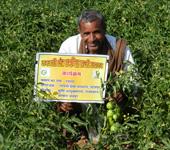 This is a story of Mr. Valabhai Meena from the village Padarada is a living example of how vegetable production can successfully provide a sustainable livelihood. This example showcases the potential & opportunity for livelihood enhancement in this tribal area. Valabhai was growing tomato since the past 4-5 years in the Rabi season. The input was locally purchased without any proper guidance. Although he is very hardworking farmer and had been producing vegetables for many years but the earnings were not enough for sustaining a decent standard of living. He was hardly generating an income of Rs. 10000/- to 12000/- from his tomato cultivation. In year 2011-12 he was selected form village Padarada for our vegetable production initiative and the results speak volumes about the effectiveness of our initiative :
This is a story of Mr. Valabhai Meena from the village Padarada is a living example of how vegetable production can successfully provide a sustainable livelihood. This example showcases the potential & opportunity for livelihood enhancement in this tribal area. Valabhai was growing tomato since the past 4-5 years in the Rabi season. The input was locally purchased without any proper guidance. Although he is very hardworking farmer and had been producing vegetables for many years but the earnings were not enough for sustaining a decent standard of living. He was hardly generating an income of Rs. 10000/- to 12000/- from his tomato cultivation. In year 2011-12 he was selected form village Padarada for our vegetable production initiative and the results speak volumes about the effectiveness of our initiative :
1. The number of fruits per plant increased from 10-15 to 50-60 and hence production of tomato quadrupled.
2. Because of higher production of better quality, this year in the Rabi season he was able to generate around Rs. 60000/- from his tomato cultivation on only 0.1 ha ( One Fourth Of An Acre) land.
IADP……a successful pilot which turned ‘Agriculture as Livelihood’
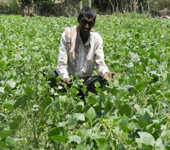 In the project areas under IGWDP lying over 31600 ha area in southern Rajasthan, majority of the farmers belong to small and marginal category. Most of the watersheds are in remote tribal areas where infrastructural facilities and access to extension services are very poor. Mandali was not an exception to this. Poor quality of inputs and unscientific pattern of farming made the livelihood in these harsh terrains highly vulnerable to climatic variability. In order to revive agriculture, which continues to be the major livelihood option, a pilot titled “Integrated Agriculture Development Programme (IADP)” was launched in Mandali watershed during Oct 2013.
In the project areas under IGWDP lying over 31600 ha area in southern Rajasthan, majority of the farmers belong to small and marginal category. Most of the watersheds are in remote tribal areas where infrastructural facilities and access to extension services are very poor. Mandali was not an exception to this. Poor quality of inputs and unscientific pattern of farming made the livelihood in these harsh terrains highly vulnerable to climatic variability. In order to revive agriculture, which continues to be the major livelihood option, a pilot titled “Integrated Agriculture Development Programme (IADP)” was launched in Mandali watershed during Oct 2013.
The pilot took off with formation of a 25-member Farm Field School carved out from Farmers Clubs formed in the watershed. Farmer-wise land used planning, improved cropping practices under guidance from experts during critical field operations, training locals as Para Agriculture Experts (Krishak Mitra), training women farmers and knowledge management through FFS are among the major activities.
The average earning of an individual farmer through the project is Rs0.75 lakh in a year from vegetable cultivation in only 0.05 ha area. All selected farmers are growing wheat, maize and cluster bean with improved package of practices (PoP). Two farmers successfully tried System of Wheat Intensification (SWI) technique.
A Much Required Technology Transformation - Meadow Cultivation
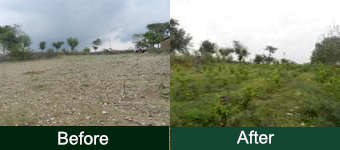 In a village like Mandali in the southern Rajasthan, where socio-cultural factors were very much relevant; villagers had to face high health care expenses, huge costs for hospitalization, sources of debts including the expenses for children education and the costs for daughter’s marriage. All these factors were a huge challenge for small and marginal farmers facing unemployment and having a land holding of 0.5 hectares or even less.
In a village like Mandali in the southern Rajasthan, where socio-cultural factors were very much relevant; villagers had to face high health care expenses, huge costs for hospitalization, sources of debts including the expenses for children education and the costs for daughter’s marriage. All these factors were a huge challenge for small and marginal farmers facing unemployment and having a land holding of 0.5 hectares or even less.
After observing the challenges in this area, Gayatri Seva Sansthan took the initiative of introducing the Meadow cultivation practice in Mandali Watershed under IGWDP, NABARD, where they would be able to grow orchard crops in small piece of land and could gain more income through it. The basic idea behind this project was to ensure a better livelihood for the farmers with small landholdings and also to improve their standard of living. A native farmer of the village named Shri Nandlal permitted us to treat his barren land of about 2 hectares which was not suitable for his general farming practices and started the Meadow cultivation of Guava with all basic requirements for the cultivation and we acknowledged him with information of fertilization and pruning practices.
At times when some problems were faced by the farmers during this period of growth, we guided him with a proper remedy and treatments. The success of this initiative reflects in the Farm field of Shri NandLal, who adopted this new technique for the first time in Rajasthan on his barren land. Almost all the Guava plants in his field are growing quite healthy and have started bearing fruits also just one year after plantation. The income gained by Shri NandLal by adoption of this innovative idea has improved his standard of living quite well. He has started paying his debts which were earlier a huge burden on his chest.
